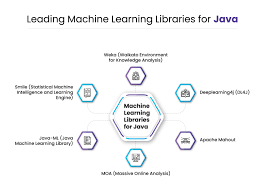As technology evolves at a breathtaking pace, the integration of Java Web Development Services with machine learning is forging new paths in digital transformation. No longer is Java just a platform for enterprise-level applications—it’s now at the heart of intelligent, data-driven web solutions that adapt, predict, and learn from user behavior. This shift not only redefines how developers build applications but also how users experience them.
In this blog post, we explore how machine learning is reshaping the capabilities, performance, and possibilities of Java Web Development Services, and why this synergy is crucial for the future of modern web applications.
Why Machine Learning Matters in Web Development
Machine learning, a branch of artificial intelligence, allows computers to learn from data patterns and improve over time without explicit programming. When applied to web development, especially with Java, it enables:
- Personalized user experiences
- Predictive analytics
- Smart recommendations
- Automated testing and debugging
- Real-time threat detection
Such capabilities are game-changers, particularly for businesses that prioritize agility, user engagement, and data security.
Java’s Long-Standing Power Meets AI
Java’s robustness, scalability, and security make it an ideal companion for machine learning frameworks. When enhanced with ML, Java Web Development Services can harness powerful libraries like:
- Deeplearning4j – Native deep learning support in Java
- Weka – Data mining and analysis for predictive models
- MOA – Stream mining for real-time data processing
- Encog – Neural network framework for rapid implementation
Combining these with traditional Java web frameworks like Spring Boot or Hibernate creates dynamic applications capable of evolving with data.
Enhanced User Experiences through Personalization
One of the most visible impacts of machine learning in Java Web Development Services is in personalization. Websites and web applications can:
- Recommend content tailored to each user’s preferences
- Adapt UI/UX based on user behavior
- Offer intelligent chatbots that learn over time
This shift dramatically improves user engagement, conversion rates, and customer satisfaction—metrics that matter most in the digital economy.
Smart Search Capabilities
Search functionality isn’t just about keywords anymore. ML-powered Java applications can:
- Interpret user intent
- Auto-correct and suggest searches
- Rank results based on contextual relevance
For example, an e-commerce platform built on Java and powered by ML can refine product searches based on a customer’s past behavior, making navigation seamless and intuitive.
Predictive Analytics for Business Intelligence
With integrated ML models, Java web apps can analyze historical data to:
- Predict market trends
- Anticipate customer churn
- Forecast inventory needs
This empowers businesses to make smarter decisions faster, adding a new layer of strategy to data collection and processing.
Real-Time Fraud Detection and Security
Security is paramount, and ML strengthens Java Web Development Services by enabling real-time threat detection. Applications can now:
- Recognize patterns in login behavior
- Detect unusual activity
- Trigger automatic alerts or countermeasures
ML models can be trained on vast security datasets, making them capable of identifying threats before they escalate.
Accelerated Debugging and Testing
Machine learning also improves the development workflow itself. Using anomaly detection algorithms, developers can:
- Identify bugs faster
- Optimize code for performance
- Automate testing with self-correcting capabilities
In essence, the machine becomes a second pair of eyes—tireless, analytical, and always learning.
Challenges to Overcome
While the integration is promising, it comes with challenges:
- High computational demand for training models
- Need for large, clean datasets
- Skilled workforce for ML model development
However, with cloud computing, pre-trained models, and open-source communities, many of these obstacles are becoming manageable.
Real-World Applications
Several industries already use this synergy effectively:
- Finance: For fraud detection and credit scoring
- Healthcare: For patient risk prediction
- E-commerce: For personalized shopping experiences
- Education: For adaptive learning platforms
Each scenario leverages Java Web Development Services augmented with ML to deliver scalable, secure, and intelligent systems.
Future-Proofing Your Applications
Businesses that adopt machine learning in their Java development stack are not just solving current problems—they’re future-proofing their applications. The ability to evolve, adapt, and personalize in real-time will soon be expected, not optional.
Final Thoughts
As the digital world grows more complex, the fusion of Java Web Development Services and machine learning is not a luxury—it’s a necessity. From personalization to prediction, automation to security, ML redefines what’s possible with Java.
Now is the time to reimagine what your applications can achieve. Whether you’re launching a startup or scaling an enterprise platform, intelligent Java web development is your competitive edge.
Let us help you build smarter Java web solutions. Contact Adequate Infosoft today or call +91-120-4198878 to bring your vision to life.
